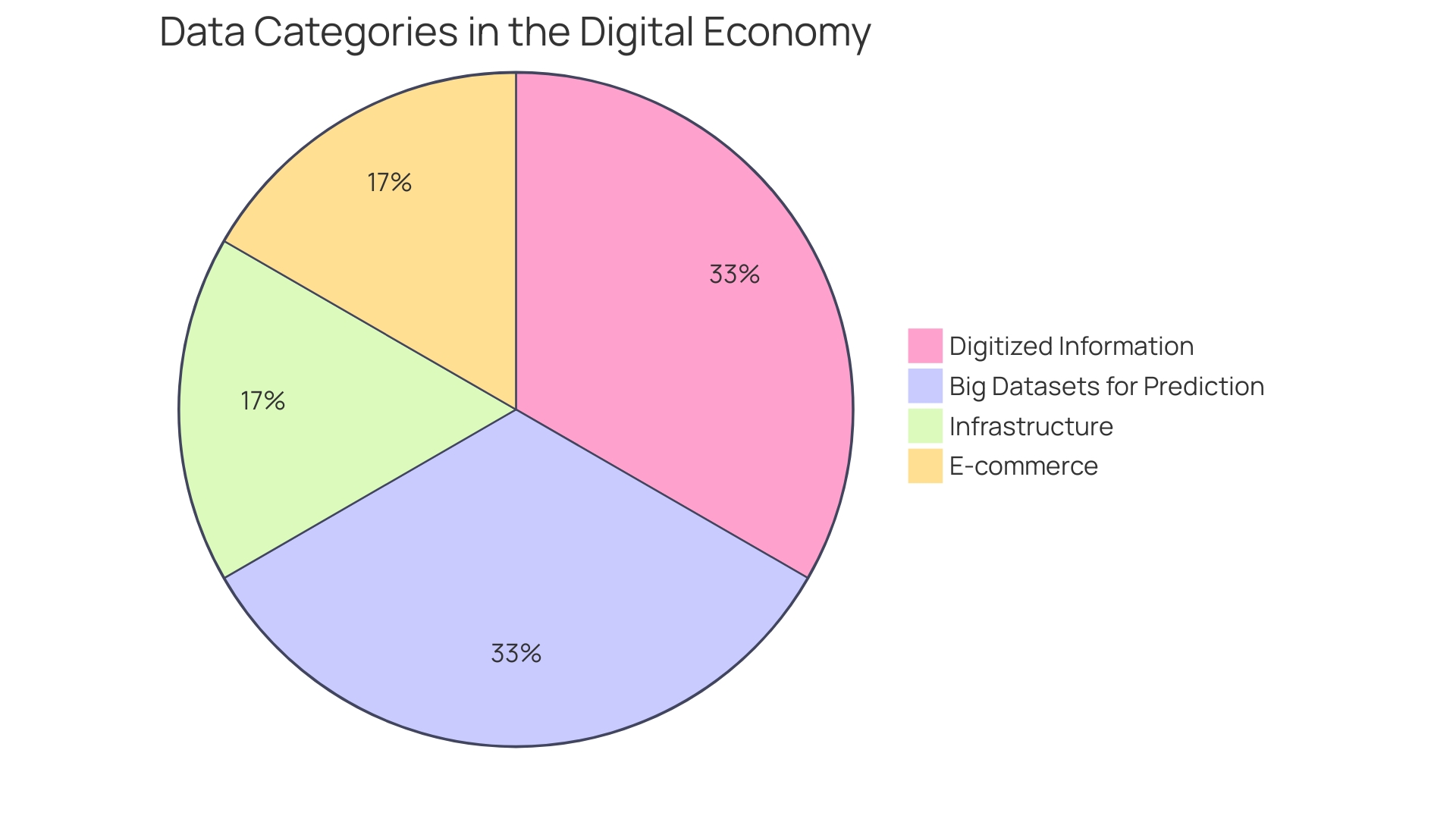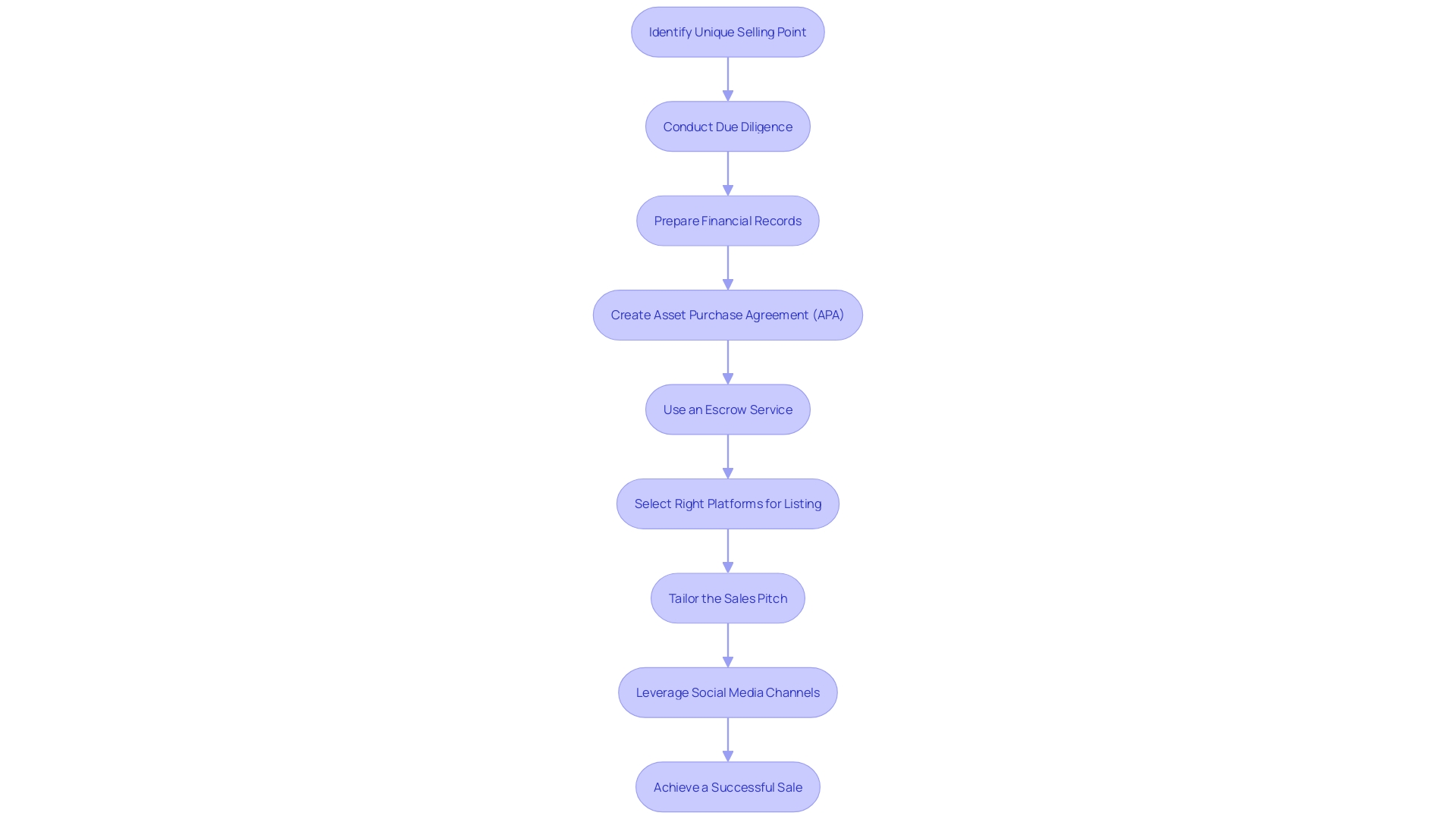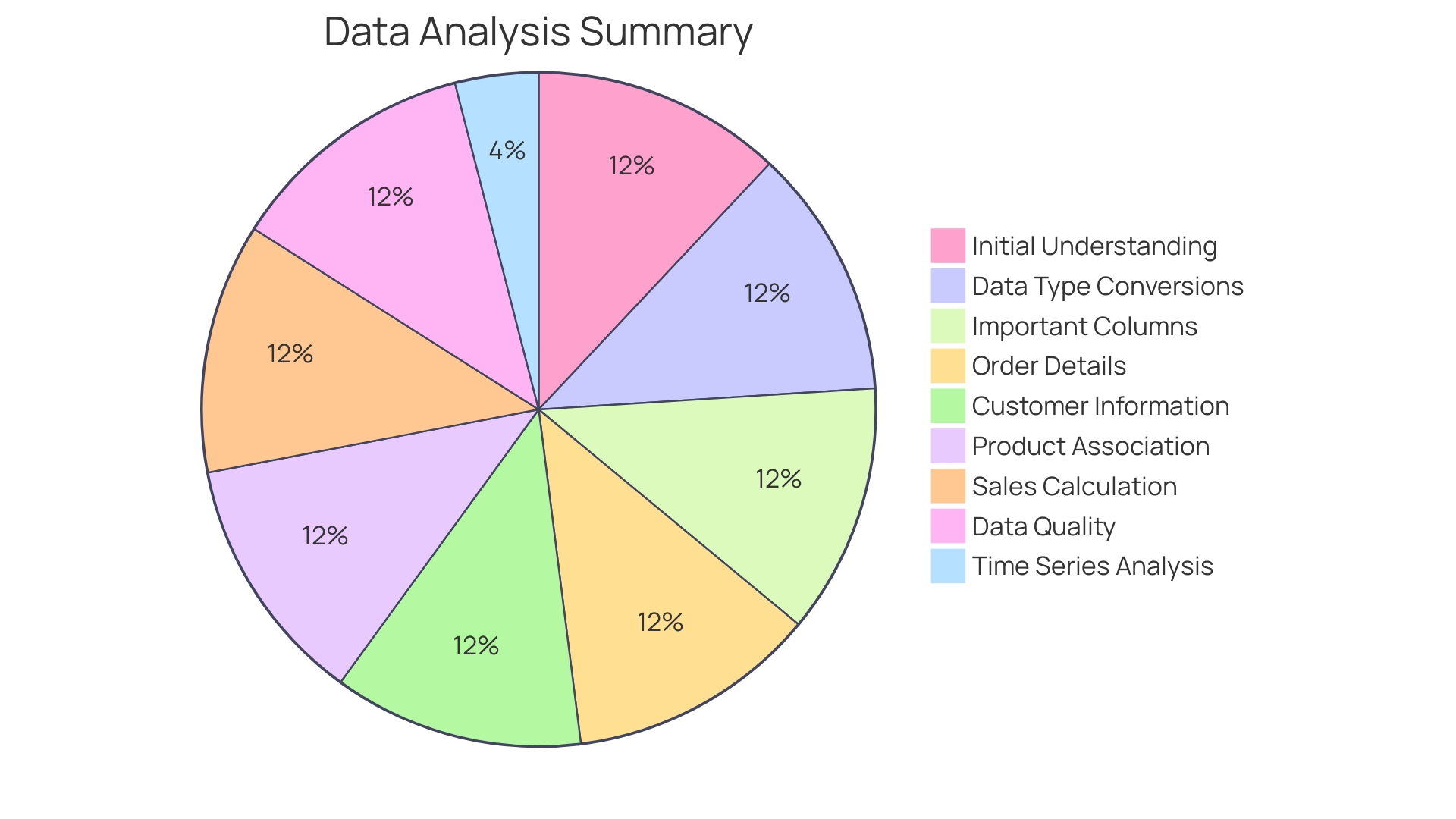Introduction
Positioning your online business for a successful sale requires strategic planning and insight into the market. Whether you're starting from scratch or buying an established business, understanding the unique costs and strategies involved is crucial. From branding to website creation, marketing to niche understanding, each step plays a vital role in carving out your space in the e-commerce landscape.
To capture your target audience's attention, a solid digital marketing strategy and manageable operational costs are imperative. Valuing your business accurately is non-negotiable, as is understanding its future potential. Platforms like BizBuySell can help you find the right buyer, while developing a strong brand personality sets you apart.
Avoid ineffective approaches and equip yourself with the right sales knowledge and mindset to effectively reach your audience and sell your online business.
Preparing Your Online Business for Sale
Positioning your online business for a successful sale involves strategic planning and insight into the market. Recognize that whether you're buying an established business or starting from scratch, each path involves unique costs and strategies. Branding, website creation, marketing, and understanding your niche are all crucial steps in carving out your own space in the e-commerce landscape.
To capture your target audience's attention, you need a solid digital marketing strategy and a plan to keep operational costs manageable. It's imperative to think of your business as a sellable asset right from the start. Keeping detailed, transparent records of every transaction, as exemplified by businesses that maintain daily updates in tools such as Google Spreadsheets, can instill confidence in potential buyers.
Valuing your business accurately is non-negotiable. Avoid the common pitfall of guessing your business's worth; instead, invest in a professional business appraiser. They can provide a fair market valuation by analyzing financial statements, assets, customer base, and industry trends.
As highlighted by industry experts, understanding your business's future potential is also a critical factor in deciding whether to sell.
In terms of reaching potential buyers, platforms like BizBuySell offer a comprehensive marketplace with a multitude of options for various industries and price points. This resource can be a gateway to find the right buyer for your business.
Branding is another aspect that cannot be overlooked. Developing a brand personality that resonates with your target customers' characteristics and purchasing habits can set you apart in the market. Knowing your industry's value metrics and how your business compares to others is vital when engaging with potential buyers, especially those well-versed in mergers and acquisitions within your vertical.
Finally, steer clear of the ineffective approach of simply sharing your product on social media with no following. This method often leads to no views, no traction, and no sales. Instead, equip yourself with the right sales knowledge and mindset to effectively reach your audience and sell your online business.
Valuing Your Online Business
Understanding the value of your online business is a pivotal step in attracting the right buyers and securing a fair deal. The story of Tech Ladies, which began as a modest meetup and grew into a multi-million dollar business acquired by a larger entity, exemplifies the importance of a strong community and a forward-looking business model. A valuation that accounts for your business's intrinsic worth, considering both tangible assets and intangible elements like customer base and market trends, is essential.
With the digital landscape potentially shifting due to events like Google's antitrust trial, it's more crucial than ever to have a clear grasp of your business's value in the ever-evolving online marketplace.
When contemplating the sale of your online business, think about your goals and the type of business you're running. Whether it's a passion project or a purely financial venture, understanding the nature of your online business and the work required to maintain its profitability is crucial. Types of online businesses vary, and each has its own set of monetization strategies and operational demands.
Avoid the pitfalls of neglecting a proper valuation, as emphasized by experts who warn against underestimating or overestimating your business's worth. This misstep can deter potential buyers or result in a less-than-desirable sale price. Professional valuation services can provide a thorough analysis of your financials, assets, and industry position to establish a fair market value.
As the digital economy grows, data becomes an invaluable asset, especially large datasets used for predictive technologies like AI and machine learning. These predictions can be about customer behavior, demand, and ad engagement, showcasing how data differs from traditional assets. With the expansive scope of the digital economy, encompassing infrastructure, e-commerce, and priced digital services, the value of your online business could be significantly impacted by your data assets and their predictive power.

Identifying Potential Buyers
Unlocking the sale of your online business hinges on connecting with the ideal buyer. To zero in on prospects, consider your business's unique selling point and ensure it resonates with the right audience. Buyers often seek established businesses to bypass the initial outlay and ongoing costs tied to branding, website creation, SEO, and marketing—key factors that your business should already excel in to attract attention.
When listing your business, preparation is key. Conduct thorough due diligence on your company just as a prospective buyer would. This means having all financial records, customer data, and operational insights at hand, demonstrating transparency and business value.
An Asset Purchase Agreement (APA) is a vital document, and getting legal assistance to craft one ensures both parties are clear on the terms of the sale. Using an escrow service for the transaction not only protects the funds but also secures the asset transfer, providing peace of mind for both buyer and seller.
To effectively present your business, consider the platforms where your listing will shine. Whether it's an e-commerce giant like eBay or Amazon, each has its nuances in terms of customer base and selling strategies. For instance, eBay's auction-centric format requires a different approach compared to Amazon's vast marketplace.
Tailor your sales pitch to highlight how your business leverages these platforms' strengths.
Remember that e-commerce offers a global reach and generally lower overhead costs compared to traditional retail. These benefits are attractive selling points to potential buyers. In today's digital age, platforms such as Twitter and Quora can also serve as valuable channels to amplify your listing and connect with potential buyers who are actively engaging in industry conversations.
In conclusion, selling your online business demands a strategic approach to appeal to the right buyer. By showcasing your business's strengths, ensuring legal safeguards, and leveraging the right online platforms, you can navigate towards a successful sale.

Creating a Sales Strategy
Developing a standout sales strategy is much more than a mere suggestion for your online business—it's a vital component in the success of your digital storefront. It all starts with a deep understanding of customer needs, which is not just beneficial but essential. By delving into market research, surveys, and social media insights, you can unearth valuable information about customer preferences, interests, and demands.
This intel forms the foundation of a sales strategy that resonates with your audience, offering tailored solutions that foster robust customer relationships.
Consider the timeless relevance of certain knowledge, akin to the way database indexing skills remain in demand. Similarly, crafting a sales pitch that captures attention and builds connection can have a long-lasting impact on your business. This is not about creating a lengthy and complex blueprint; rather, it's about focusing on clarity and brevity, ensuring that every aspect of your sales strategy is direct and potent.
Incorporating sales data analysis into your strategy is also critical. It's not just about tallying up sales; it's about uncovering the stories behind the numbers—trends, patterns, and actionable insights. This process begins with setting clear, measurable goals and identifying relevant metrics that align with those objectives, such as lead conversion rates or sales cycle lengths.
Remember, the most successful companies, like the tech titan Apple, are those with a keen understanding of their market and a unique value proposition. They demonstrate that a well-crafted sales strategy not only informs but also captivates and converts. By following a carefully considered approach, you can elevate your online business and ensure that your sales strategy is as innovative and impactful as the products or services you offer.

Marketing Your Business for Sale
To captivate the attention of potential buyers and successfully sell your online business, an impactful marketing strategy is paramount. Leveraging the power of well-researched marketing techniques, as highlighted by marketing scholar Islam Gouda, can help create services and products that resonate with people's needs, connecting on a deeper level with your target market. Consider the success of a piece of content published by Tractable, which led to a significant sales lead without any PR solicitation, emphasizing the potency of strategic content marketing.
Implementing foundational tools such as Google Analytics and Facebook Pixel, alongside a well-investigated keyword strategy, has proven to be a game-changer for businesses, like the hotel company that saw a substantial increase in bookings through effective PPC campaigns. As platforms like eBay and Amazon demonstrate, understanding the nuances of each platform can guide you to tailor your marketing approach, ensuring your strategies are platform-specific and more likely to succeed.
With nearly 370 million monthly active users on Twitter, it's clear that social media can be a powerful marketing tool, but it's crucial to stay informed about trends and audience shifts. A strong presence in places where your potential customers are actively searching, like Google search, can significantly boost your visibility and traction. Remember, the more you understand your industry, the better equipped you'll be to identify and utilize the most beneficial marketing channels, from conferences to podcasts, to reach your audience effectively.
Negotiating the Sale
When it's time to negotiate the sale of your online business, being prepared and informed is key. Understanding the difference between a stock sale and an asset sale is the first step. In a stock sale, you're selling ownership shares of your business, which is common in C and S corporations.
An asset sale, on the other hand, means you're selling the business's assets, such as equipment and property.
Getting a clear picture of your business's value is non-negotiable. This involves more than just a gut feeling or a random number; it requires a professional valuation. A business appraiser can assess your financials, assets, customer base, and industry trends to establish a fair market value.
This is crucial for negotiations to make sure you don't sell for less than your business is worth.
Remember, the type of sale you choose has tax implications and affects your capital gains. Capital gains are calculated based on the difference between your initial investment and the selling price, adjusted for factors like depreciation and improvements. For instance, buying a business for $200,000, investing $100,000, and selling for $350,000 would mean a $50,000 capital gain.
As you negotiate, it's also important to consider the practicalities of running an online business. For those starting from scratch, expenses range from branding and website development to domain names and digital marketing strategies. Keeping costs down and crafting a strategy that resonates with your target audience are key considerations.
Lastly, leveraging a community of like-minded individuals, such as the Rhodium Network, can provide invaluable support and knowledge sharing throughout the selling process. This network of successful digital entrepreneurs often holds events to exchange insights and experiences, which can be especially beneficial during a high-stakes negotiation.
Legal and Financial Considerations
When you're ready to sell your online business, it's essential to understand the intricacies of legal and financial aspects to safeguard your interests. Knowing whether to opt for a stock sale or an asset sale is your first step. In a stock sale, the buyer takes over the ownership by purchasing shares, which is common with C and S corporations.
An asset sale, on the other hand, is the sale of the company's physical assets, like buildings and equipment.
Capital gains, which are the profits from your business sale, play a big role in determining your financial outcome. The difference between your initial investment, any additional investments, and the final sale price will determine your capital gains or losses. For example, purchasing a business at $200,000, investing $100,000 in improvements, and selling at $350,000, leaves you with a capital gain of $50,000.
To ensure you're making the most tax-efficient sale, familiarize yourself with the differences between short and long-term capital gains rates as they apply to stock and asset transactions. This knowledge is fundamental to maximizing your net profit from the sale.
The value of your business assets isn't limited to the purchase price; you must also consider the total costs, including installation and training. As Stephanie Wells from Formidable Forms suggests, a thorough assessment of your company's future potential is vital when you receive a purchase offer.
To facilitate a smooth transaction, consider drafting an Asset Purchase Agreement (APA) and using an escrow service to securely transfer funds and assets. This can be managed with the help of online resources or by hiring a lawyer experienced in such deals. Platforms that specialize in business sales can also handle these details, with approval times for listings typically ranging from a few hours to a week.
Abhijeet Kaldate from Astra WordPress Theme emphasizes the importance of finding your niche and a unique selling point — critical factors for a successful sale. Meanwhile, don't overlook the practicalities of online business, such as digital marketing strategies and cost management, to bolster your business's appeal to potential buyers.
Closing the Deal
Finalizing the sale of your online business is a pivotal moment that encapsulates the hard work and strategy put into building your digital empire. To culminate this process successfully, it's crucial to understand the intricacies involved in sealing the deal.
The transaction isn't just about signing a contract; it's a multi-layered process that includes due diligence from both parties, transparent financial disclosures, and a comprehensive valuation. For instance, hiring a valuation professional to assess your business's worth can provide a solid foundation for negotiations. They meticulously analyze financial statements, customer base, industry trends, and assets to ascertain a fair market value, ensuring you don't undervalue your digital asset or deter potential buyers with an inflated price tag.
Moreover, the art of selling an online business doesn't end at valuation. It extends to the strategic decisions made from the outset. Considering your niche, unique selling points, and digital marketing strategy plays a significant role in attracting the right buyer.
Whether it's a side project turned lucrative business or a carefully cultivated e-commerce platform, your business's story and operational blueprint can greatly influence the sales outcome.
As you maneuver through the final stage of selling your online business, remember to leverage the lessons from past entrepreneurs. Avoid common pitfalls like inadequate preparation or neglecting the fine print of a deal. Embrace the culmination of your entrepreneurial journey with the same meticulous attention that fostered your business's growth, and ensure a smooth transition that reflects the value and potential of your online venture.
Post-Sale Transition and Support
Ensuring a smooth transition post-sale is as critical as the sale itself for the longevity and continued success of your business. It's a period marked by change, and your proactive approach can significantly influence the new owner's ability to seamlessly take the reins. Taking a leaf from Vodafone's playbook, where their shift to cloud architecture revolutionized customer experience and operational efficiency, you too can facilitate a better transition by leveraging modern tools and strategies.
Utilize cloud-based systems to provide the new owner with easy access to important documents and processes. Just as Vodafone enabled customers to manage their services effortlessly from home, ensure that the new owner can do the same with business operations. This will not only simplify the transition but also empower the new owner to make informed decisions.
Moreover, just as Lemonaid Health streamlined their telehealth services to overcome growth challenges, it's beneficial to simplify the business handover process. Create clear, easy-to-follow guidelines for the new owner, covering everything from daily operations to customer service protocols.
Consider the lessons from Sephora and government grants that bolster small businesses. Offer support to the new owner similar to how grants enable businesses to expand and improve. This might include providing training sessions, sharing industry contacts, or even staying on in a consultancy role for a set period.
Remember, the goal is to ensure the continuity of the service or product that your customers have come to expect. By doing so, you not only help the new owner but also preserve the legacy and reputation of the business you've worked hard to build. A thorough valuation and a structured handover plan will set the stage for the new owner's future success, reflecting positively on the time and dedication you've invested in your business.

Conclusion
In conclusion, positioning your online business for a successful sale requires strategic planning, understanding of market dynamics, and a solid digital marketing strategy. Valuing your business accurately and identifying the right buyer are crucial steps in the process. Developing a standout sales strategy that resonates with your target audience and leveraging effective marketing techniques are essential for capturing the attention of potential buyers.
To ensure a fair deal, it is important to conduct thorough due diligence, maintain transparent financial records, and consider legal and financial considerations. Understanding the difference between stock sales and asset sales, as well as the tax implications, is vital. Crafting an Asset Purchase Agreement (APA) and utilizing escrow services can help facilitate a secure transaction.
Throughout the selling process, it is crucial to stay informed about industry trends and leverage the power of digital platforms. Utilizing cloud-based systems and providing clear guidelines for the new owner can facilitate a smooth post-sale transition. Offering support, such as training sessions or industry contacts, can further contribute to the new owner's success.
By following these strategic steps and leveraging the lessons learned from successful entrepreneurs, you can position your online business for a successful sale. Remember to showcase your business's strengths, accurately value your business, and effectively reach your target audience. With careful planning and execution, you can achieve a successful sale and ensure the continuity of your business's legacy.




